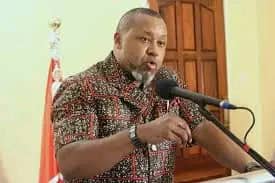By Burnett Munthali
In a significant political shift, Welani Chilenga, a Member of Parliament (MP) representing the Democratic Progressive Party (DPP), has officially “crossed the floor” to join the Malawi Congress Party (MCP), marking a major realignment in the country’s political landscape.
Chilenga made the announcement during a parliamentary session, declaring his allegiance to the MCP. In his statement, the MP echoed the ruling party’s popular slogan, “Boma ndi lomweli” (The government is one), signaling his support for President Lazarus Chakwera’s administration and its policies.
The move is seen as a pivotal moment in the current political climate, with analysts suggesting that it reflects broader shifts within Malawi’s political elite. Chilenga, who had previously been an outspoken critic of the government as a member of DPP, explained his decision by emphasizing the need for unity and cooperation in addressing the country’s challenges.
“After much reflection, I have decided to join the government to contribute positively towards the development of our beloved country,” Chilenga said in his address. “I believe that working together under the MCP will allow us to bring about the change Malawi needs. As we say, ‘Boma ndi lomweli.'”
His decision to align with the MCP has raised eyebrows within political circles, as it represents a weakening of the opposition DPP’s ranks. Chilenga’s move is seen as part of a broader trend of shifting allegiances in Malawi’s political scene, with several high-profile politicians previously switching sides.
The DPP, which was once the dominant force in Malawian politics under the leadership of former President Peter Mutharika, has faced a number of challenges following the 2020 elections. Internal divisions and the fallout from the loss of the presidency have weakened the party’s influence in both parliament and the public eye.
While the DPP has yet to issue an official response to Chilenga’s defection, the move is likely to have significant implications for party dynamics moving forward. It also underscores the fluid nature of Malawi’s political landscape, where alliances and allegiances often shift in response to changing circumstances.
The MCP, on the other hand, has welcomed Chilenga’s decision, viewing it as a strengthening of the party’s position within Parliament. Party officials have praised Chilenga for his commitment to the country’s progress and for joining efforts aimed at national development.
Chilenga’s floor-crossing marks a significant moment in the ongoing political evolution of Malawi, and as the country looks ahead to future elections and legislative activities, his move could influence the balance of power in Parliament and beyond.
As the political landscape continues to evolve, all eyes will be on how this shift affects both the DPP and the MCP in the lead-up to future elections, with party dynamics and strategies likely to play a key role in shaping Malawi’s political future.




